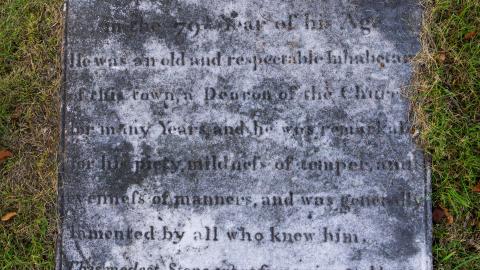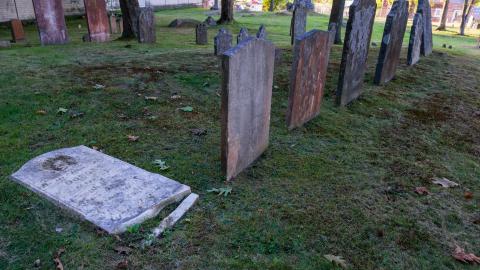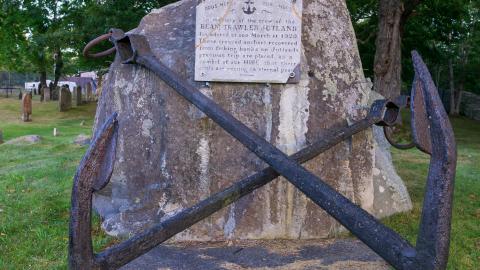History
The Old Common Burial Ground in Liverpool was set aside as a burying ground in the 1764 division of lots among the New England Planter proprietors who first settled the township in late 1759. Originally called the Congregational Cemetery, it was used by all denominations to bury their dead until it was filled to capacity in the 1890s. The heritage value of the Old Common Burial Ground lies in its being the first cemetery in Liverpool and the final resting place of many of the community’s earliest settlers. It is also valued for its association with Dr. Henry Farish, who initiated the efforts to reclaim the cemetery after a long period of neglect.
Although the earliest date on a headstone here is 1761, it is known that there were unmarked burials as early as 1759. Even into the nineteenth century some burials were unmarked because relatives could not afford to buy grave markers from New England, the closest source of such commodities for many years after the initial settlement of Liverpool. According to local lore, the first burial here was not of one of the proprietors, but of a Mi’kmaq captain who went by the name of Joseph Quoxies who had earned the settlers’ respect and friendship. It is believed that other native people were buried here in unmarked graves as well. Also buried here is Hallett Collins, who was ten years old when his family came to Liverpool with the other first settlers. Years later he fathered twenty-six children, including Hon. Enos Collins whose vast holdings in Halifax and elsewhere made him one of the wealthiest men in British North America during his lifetime.
After the cemetery was filled to capacity in the late 1890s, it was neglected for many years and became overgrown with briars, shrubs and trees. During the early part of the twentieth century Dr. Henry Farish, a local physician, and other local residents undertook the task of clearing the debris and overgrowth from the burial ground. A fountain was constructed in a low spot near the back of the cemetery sometime around 1910 and in 1921 the “Jutland” memorial was erected near the Main Street entrance, in memory of those who died when the ship sunk in March, 1920. In 1936 a fence was erected surrounding the cemetery on Main, Old Bridge and Church Streets, with funds provided by the Queens County Historical Society, Town Council and private donations.
In more recent years further enhancements have been made to the Old Common Burial Ground including the addition of several interpretive signs which describe some of the kinds of grave markers, brief biographies of some of the people buried there, and some historical notes about the founding and growth of the community of Liverpool. There are also historic photographs of the cemetery displayed, which detail some of the changes in the property over the years.
Source: Municipal heritage property files' "Old Common Burial Ground", Region of Queens, NS.
About this location
The Old Burial Ground, located in Liverpool on the South Shore, is the town’s earliest burial ground (1760), a resting place for several of its first proprietors. All the headstones have been researched and documented. The interpretive panels tell interesting stories about the gravestones ranging from 1760 to the last recorded burial in 1894.







